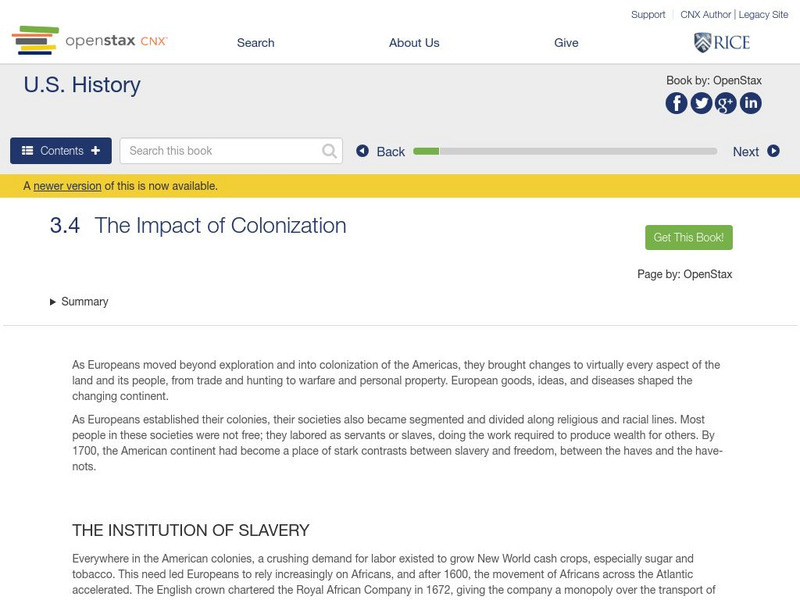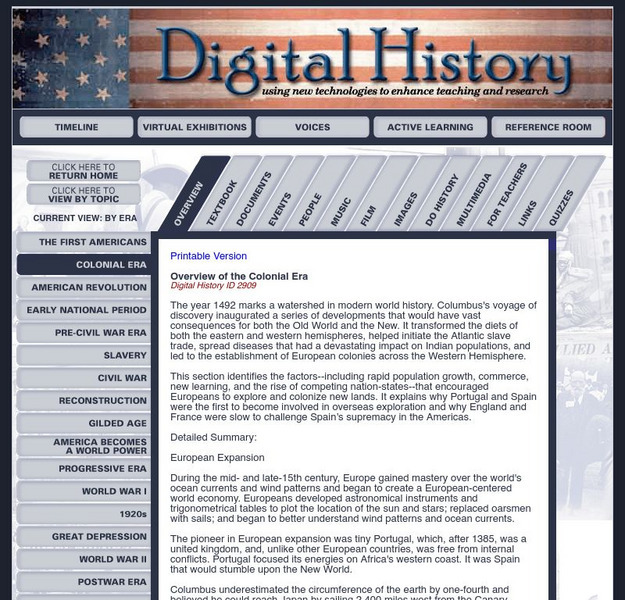Curated OER
Slave Auctions in South Carolina
Students examine primary sources in the form of auction records, create frequency charts, graphs and diagrams that they analyze to anwer questions followed by the writing of a paper that demonstrates their comprehension of the lesson.
Curated OER
World War II Webquest
Tenth graders work with a partner to locate and follow the directions of a webquest of their choice. Using the internet, they research their topic in depth and write a paper on their findings. They are assessed by the criteria on the...
Curated OER
Forced Assimilation
Students identify ways that a society promotes assimilation and examine areas where it still occurs in our present culture. They assess the value of assimilation.
Curated OER
Early Settlements
Students embark on a journey through colonial times. In this early settlement lesson, students come to understand what life was like for the settlers in the early colonies. Students research and create projects illustrating their...
Curated OER
Cabeza de Vaca Meets the Coahuiltecans
Students examine the difference between primary and secondary sources by examining the journal of Cabeza de Vaca and creating a poster about the Coahuitecan Indian groups. They portray a scene of the groups in 16th Century south Texas.
Curated OER
Re-covering Imperial History
High schoolers read about imperialism in Japan and China and write their own book based on the story they read.
Curated OER
Henry Hudson: 400th Anniversary of Discovery
Commemorate the discovery made by Henry Hudson and delve into the Age of Exploration.
Curated OER
History and Government of the United States
In this U.S. worksheet, students take notes in a graphic organizer as they read several passages, then answer four comprehension questions.
Curated OER
The Trading Post with the Most: Colonial Dorchester's Settlement and Economy
Eighth graders explore the Dorchester settlement, For this American colonial history lesson, 8th graders examine primary resources and maps from the Dorchester trading post in order to learn about its contributions to the...
Curated OER
The Tet Offensive and the Vietnam War
Students comprehend how the United States became involved in what one historian called the quagmire. Students identify and analyze the importance of the Tet Offensive in turning American public opinion against the Vietnam War. Students...
Curated OER
From Forest to Farm and Back Again
Students review and discuss a given set of questions regarding ecosystems. They analyze essays, maps and historical documents on timber harvesting and regeneration and then complete worksheets.
Curated OER
Who Ate it First?
Students complete the Seeds of Change worksheet by conducting research on the Seeds of Change website. They list foods native to the Eastern and Western hemispheres, and compile a list of recipes for a meal common after the era of...
Curated OER
Nationalism and Immigration
Students use the internet to research how immigration patterns changed after 1880. Using this information, they create a pie chart to organize it effectively and discuss how immigration changed Europe and the United States. They also...
OpenStax
Open Stax: The Impact of Colonization
By reading this section of a chapter on "Colonial Societies," students will be able to explain the reasons for the rise of slavery in the American colonies, describe changes in Indian life, including warfare and hunting, contrast...
National Humanities Center
National Humanities Center: America in Class: Failed European Colonies in the New World
Lesson that examines some of the reasons European efforts to establish colonies in the New World were often met with failure. It focuses on the story of nine Jesuit priests who started a small colony on Chesapeake Bay in the hopes of...
Other
The Fur Trade: Its Impact on Native America
Information on the fur trade and its impact on Native Americans. The demands of the Europeans for fur increased competition among the Native American groups. It changed the character of warfare among Native American populations and...
Louisiana Department of Education
Louisiana Doe: Louisiana Believes: Social Studies: Grade 5: Early Colonization of North America
This sample task contains a set of primary and authentic sources about the early colonization of North America.
The History Cat
The History Cat: Age of Exploration: The Columbian Exchange
A fascinating look at the exchanges that took place around the world after the Americas were discovered. This covered the gamut from diseases which wiped out 90% of the native peoples in North and South America, to farm animals, tools,...
National Humanities Center
National Humanities Center: Toolbox Library: Indian Relations, American Beginnings: 1492 1690
One modern historical assessment and several original accounts of the mistrust, negotiations, alliances, trading, and disease transmission between European colonizers and native peoples in North America.
Digital History
Digital History: Overview of the Colonial Era
The year 1492 marks a watershed in modern world history. Columbus's voyage of discovery inaugurated a series of developments that would have vast consequences for both the Old World and the New. It transformed the diets of both the...
Library of Congress
Loc: American Memory Timeline: Colonial Settlement,1600s 1763
Read about the colonization in the New World by many European countries. Hyperlinks to you to more specific topics.
The History Cat
The History Cat: Rise and Fall of the Incan Empire
Describes the achievements and sophistication of the Incan Empire prior to being conquered by the Spaniards under Francisco Pizarro. Pizarro had their emperor, Atahualpa, executed after keeping him captive for months while the Inca gave...
McGraw Hill
Mc Graw Hill Higher Education: Old World, New Worlds
This article from McGraw-Hill Higher Education discusses European exploration in the late 1400s and 1500s and its impact on English colonization hundreds of years later.
Annenberg Foundation
Annenberg Learner: America's History in the Making: Mapping Initial Encounters
Columbus' arrival laid the basis for encounters between Europeans, Native Americans, and Africans. This unit examines how these contacts altered the way of life of peoples around the globe.





















